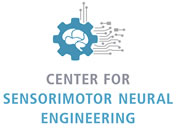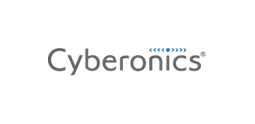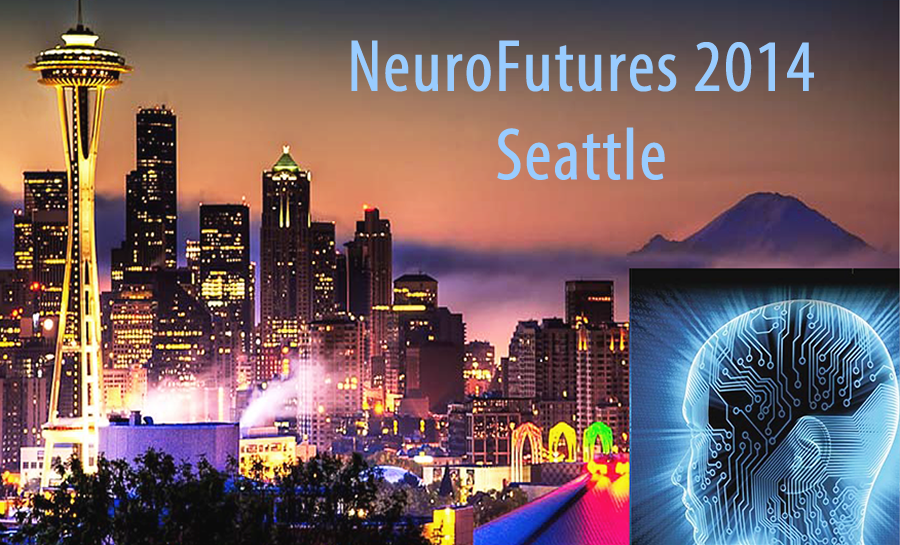NeuroFutures Conference: June 17 - 18, 2014
The first annual summit was a success!
Thank you to all who attended, presented, sponsored or in any way supported this year's effort.
Thought leaders in research, engineering, industry, and clinical domains explored how the intersection of neurotechnology innovations in neuromodulation, brain mapping, neuroimaging, big data analytics, and brain computer interfaces is transforming our understanding of neural systems and has already brought about life-changing medical treatments.
NeuroFutures Public Lecture: 7:00 PM, June 16
Dr. Andres Lozano from the University of Toronto kicked off NeuroFutures on Monday night with a talk on “The Future of Brain Stimulation: Parkinson’s, Depression, Alzheimer’s and beyond" (see his related TED Talk here).
Author and science educator David Heil moderated a Q&A session.
Why NeuroFutures?
Problem: One in four U.S. adults suffer from a diagnosable neurological disorder and a quarter of these are seriously disabled as a result. These patients endure immense physical and emotional suffering, and their family members and caregivers bear a heavy emotional and financial burden. From a scientific standpoint, the human brain is the most sophisticated computing system in the known universe, and we are only starting to understand how it works.
Opportunity: We are at the cusp of a revolution in medical technology that will transform our understanding of neural systems and enable life-changing medical treatments. We believe critical breakthroughs will come from the intersection of several fields: Neuroimaging and brain mapping are revealing the location and function of neural circuits that allow us to move, see, hear, think, and carry out other functions. Neuroscience advances are revealing the biology underlying healthy and disease states and helping us better distinguish between them. Neuromodulation is providing ways to stimulate the nervous system to treat certain neurological diseases. Recent advances illustrate the promise of neurotechnologies: New medical devices have been able to restore hearing to deaf children via cochlear implants, restore vision to a blind person via retinal prostheses, control tremors in Parkinson’s patients via deep brain stimulation, and reduce the frequency and impact of epileptic seizures via neural stimulation. How can we extend these successes to stroke, Alzheimer’s, traumatic brain injury, depression, and other diseases? Researchers in the Pacific Northwest and around the globe are making progress, but more is needed.
Plan: To accelerate the pace and impact of innovation we will bring together neurotechnology thought leaders from different disciplines to exchange ideas and forge collaborations at the two-day NeuroFutures Conference on June 17 and 18, 2014 in Seattle, Washington. We will highlight people and resources in the Northwest that position the region to play a leading role in our NeuroFuture. We will also engage the public to discuss the medical, ethical, social, technological, and economic implications of these innovations at the NeuroFutures public lecture on the evening of June 16, 2014 in Seattle. We have assembled a stellar set of speakers for these two events and are recruiting more.
Rad Roberts, Conference Chair, Center for Sensorimotor Neural Engineering
Dan Rizzuto, Allen Institute for Brain Science
Bill Rooney, Advanced Imaging Research Center at Oregon Health & Science University
Bobby Heagerty, Oregon Health & Science University
Host organization:
Center for Sensorimotor Neural Engineering
Partner organizations:
Allen Institute for Brain Science
Oregon Health & Science University
Northwest NeuroNeighborhood
SPONSORS
Gold Sponsors:
College of Arts & Sciences, University of Washington
K & L Gates
Stratos Product Development
Silver Sponsor:
Cyberonics
Media Sponsors:
Neurotech Business Report
Neurotechnology Industry Organization









